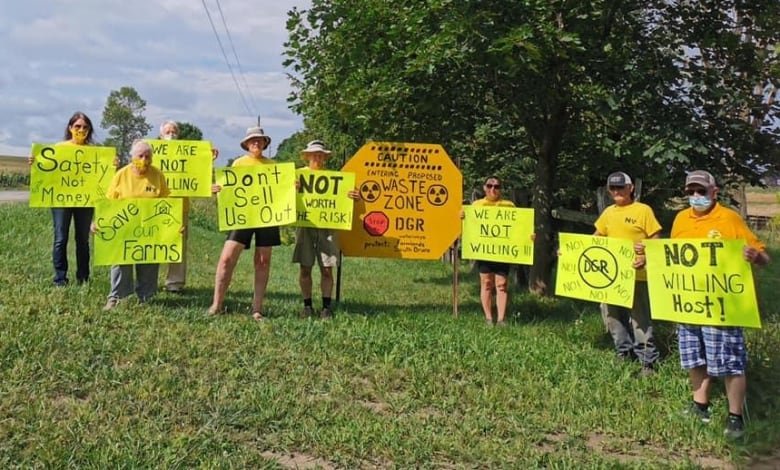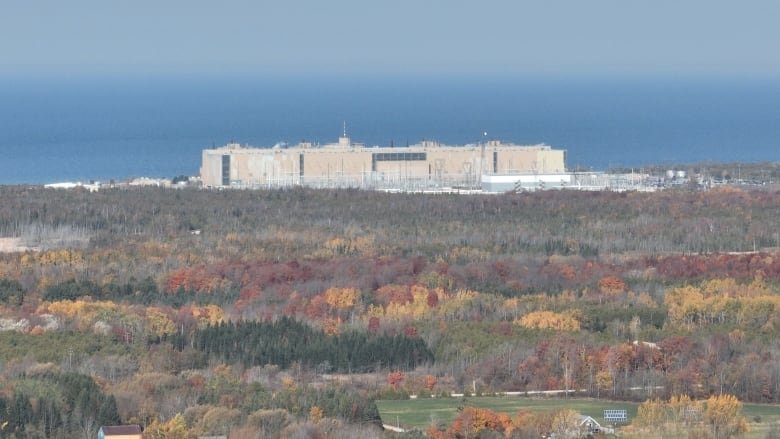A rural southwestern Ontario community embroiled in a years-long tug-of-war over its potential to host the largest nuclear waste storage facility in Canada will walk away with $10-million and an answer to a divisive question.
The Municipality of South Bruce was one of two regions being considered to host spent nuclear fuel from Bruce Power, the nuclear plant located about 50 km away.
On Thursday, the Nuclear Waste Management Organization (NWMO) said Wabigoon Lake Ojibway Nation and the township of Ignace in northwestern Ontario will be home to the $26-billion waste facility. It said South Bruce will receive a total of nearly $10-million for its participation in the selection process.
A written statement released by the municipality congratulates the NWMO for picking a candidate, and the communities selected.
“Through its 12-year participation in the site selection process the Municipality has positioned itself to pursue alternative economic development opportunities,” reads a written quote attributed to South Bruce Mayor Mark Goetz.
Goetz declined an interview request with CBC News.

Local organization pleased
“This story is being told with a great big smile on a lot of faces,” said Michelle Stein, a local farmer and member of the grassroots Protect Our Waterways — No Nuclear Waste.
“The announcement was literally out of the blue. It was just amazing to hear,” said Stein. “I looked at probably five, six, seven different sources just to confirm, because I couldn’t believe it.”
The NWMO promised the deep geological repository (DGR) would safely store nuclear waste hundreds of metres underground in a layered crypt.
It was touted by some politicians and locals as an on-ramp to an explosion of jobs, more subsidies from the nuclear industry and other untold economic benefits. Others, like Stein, believed the site would devalue prime farmland, affect the livelihoods of those who work it, and run the risk of contaminating drinking water.
The debate split the community almost down the middle — a schism made evident by a razor-thin margin of support for hosting the DGR in a recent referendum where 51.2 per cent were in support.
Stein says she hopes to see those divides heal.
“I do think it’s going to take a long time,” she said, looking to other nearby communities who nine or more years ago were involved in the site selection process. “There’s still division within some of those communities.”
“Hopefully we can start taking steps forward,” she said.

First Nations ‘disappointed’
The NWMO’s president and CEO, Lauri Swami, said the decision was influenced by a number of factors. Those included the composition of the earth, ease and safety of transportation of spent fuel to the site, and acceptance of the communities.
She said the thin margin of acceptance in South Bruce — less than 100 votes — didn’t play a role, however.
“In both [Ignace and South Bruce], there was a positive outcome from their processes and they conveyed that to the NWMO.”
The NWMO also needed confirmation from nearby First Nations.
Wabigoon Lake Ojibway Nation said it was willing to host the site, with Swami suggesting the lack of a firm decision from southwestern Ontario’s Saugeen Ojibway Nation and Chippewas of the Nawash impacted the selection process.
“With the recent decisions in all of those communities that both Wabigoon and Ignace have voted in favour of [hosting the DGR], we were in a position to make a timely decision,” she said.
On Thursday, Chief Greg Nadjiwon of the Chippewas of the Nawash First Nation and Chief Conrad Ritchie of the Chippweas of Saugeen First Nation was released a statement in response to the NWMO’s decision.
“The manner in which NWMO has made its own decisions is extremely disappointing,” the chiefs wrote. “NWMO made many commitments to work with us collaboratively to support our decision-making process.”
CBC News has reached out to Saugeen Ojibway Nation multiple times since South Bruce’s referendum in October, but has not received any responses.
Just days prior to the announcement that northwestern Ontario had been selected to host the site, the Joint Chiefs and Councils of the Saugeen Ojibway Nation released an update to their communities that they would soon begin the process of engaging with the community to work toward a referendum.
Now, no such referendum will happen, and the First Nations say they will focus on working with the NWMO toward removing the nuclear waste that is being stored on their land as it waits to be shipped north.


